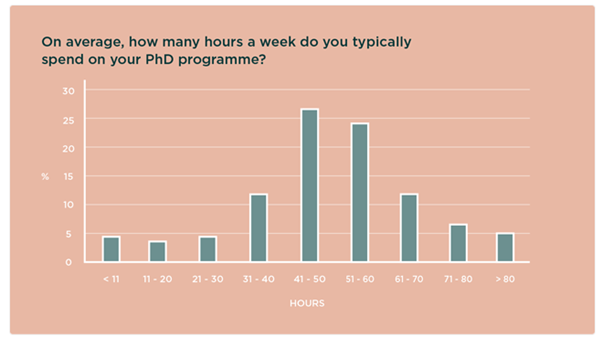
Photo by Ivan Samkov on Pexels
Most budding academics quickly come to realize that the PhD student lifestyle and pursuing a doctorate is challenging in many ways. Life as a PhD student is very different from their earlier undergraduate or post-graduate days. Academics may start out by thinking the life of a PhD student is one which offers them a considerable amount of time. However, this fleeting illusion of having lots of leisure time soon dissipates as they find the PhD student lifestyle is more hectic than a full-time job. More than half the respondents in a Nature survey said they spent 41-60 hours a week on their PhD program,1 including time for focused study, reading and writing.

In this article, we focus on key aspects that can help you create an effective routine to cope with PhD student lifestyles, with tips on how to manage your time and be more productive.
6 Steps to create the perfect PhD routine
1. Get into a schedule: The early phase of the doctoral process is an important time for PhD students and researchers. Once you realize that you must adhere to a strict timetable to achieve your goal, the PhD student lifestyle transforms to incorporate important several elements. Some researchers take on teaching or administrative responsibilities as they proceed toward their doctoral degree. Given the various tasks expected from PhD students, it is a good idea to be flexible so that you can deal with unforeseen challenges and new tasks that crop up. Life as a PhD student is more manageable when you plan and adhere to a schedule from the beginning; this allows you to better manage unanticipated tasks without feeling overwhelmed.
2. Structure your work: A day in the life of a PhD student can vary depending on the field of study and where they are in the doctoral process. Those in the social sciences and humanities arena generally tend to spend huge amounts of time in reading and research – poring over online resources, books, journals, periodicals, and archival materials. As part of their research work, they also have to design and implement surveys and conduct interviews. PhD student lifestyles for those in science and medicine usually involves them spending time conducting experiments in laboratories, while others are tasked with supervising undergraduate and post-graduate students. Once you have a better idea of your PhD student lifestyle and routine, structure your work and allocate set times for these tasks to ensure no one activity takes up too much time.
3. Set weekly and monthly goals: Once you understand the type of tasks at hand and have a routine, it’s time to start setting goals for every day in your life as a PhD student. Get yourself in the habit of using a planner (daily, weekly, monthly) to organize your PhD student lifestyle and jot down daily tasks, weekly objectives and monthly goals. Your goals could be meeting your research reading goals. polishing some essential researcher skills, or writing initial drafts of your thesis. Strive to accomplish targets listed out without compromising on related work as this can lead to delays in the life of a PhD student and sometimes an overload of stress in the short to medium term.
4. Get enough rest and sleep: The PhD student lifestyle is made up of heavy workloads and tight deadlines, which students manage by sacrificing sleep and time to rest. However, early career researchers must make sure they get a good 6-7 hours of sleep at night to be able to function optimally. Combining this sleep pattern with an 8-hour work schedule for 6 days a week is a good routine that can help optimize a PhD student’s lifestyle. A lack of sleep and rest can impact how alert you are and can result in mistakes. The fatigue that generally follows a sleep-deprived schedule often leads to health issues and burnout. Therefore, it is very important for PhD students to ensure that they not only get a good night’s sleep but also take frequent small breaks to stay healthy and productive.
5. Take a day off: Life as a PhD student is a challenging one and most are usually so stressed about work and looming deadlines that they drive themselves into a state of exhaustion. For a healthy PhD student lifestyle, it is imperative to avoid this so make it a must to take one day off from any kind of PhD-related work. Set aside one day in the week, perhaps a Sunday, to pursue a favorite hobby, socialize with others, or just laze around. This will ensure that your body and mind are rested and capable of taking on new and difficult challenges as you continue your journey toward your doctorate.
6. Set aside time for exercise: This is important aspect that must be incorporated into the PhD student lifestyle. It always helps to wake up early and go through your listed goals for the day. It is also important to remember to include time for physical exercise in your daily routine. Incorporating meditation and yoga or other relaxing pursuits goes a long way in boosting mental and physical well-bring and confidence in addition to improving memory retention.
Inculcating these simple habits into your PhD student lifestyle can not only help you be more productive and manage unplanned tasks better, but it will also ensure your life as a PhD student is one with a healthy work-life balance. We hope these tips help you create a perfect routine and fast-track your journey to achieving your PhD degree.
References:
- Campbell M. Exploring Mental Health in Academia. Technology Networks, April 2020. https://www.technologynetworks.com/tn/articles/we-are-far-from-where-we-want-to-be-an-exploration-into-mental-health-in-academia-331273
R Discovery is a literature search and research reading platform that accelerates your research discovery journey by keeping you updated on the latest, most relevant scholarly content. With 250M+ research articles sourced from trusted aggregators like CrossRef, Unpaywall, PubMed, PubMed Central, Open Alex and top publishing houses like Springer Nature, JAMA, IOP, Taylor & Francis, NEJM, BMJ, Karger, SAGE, Emerald Publishing and more, R Discovery puts a world of research at your fingertips.
Try R Discovery Prime FREE for 1 week or upgrade at just US$72 a year to access premium features that let you listen to research on the go, read in your language, collaborate with peers, auto sync with reference managers, and much more. Choose a simpler, smarter way to find and read research – Download the app and start your free 7-day trial today!


